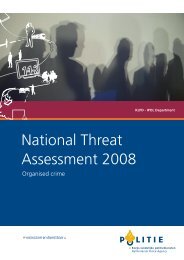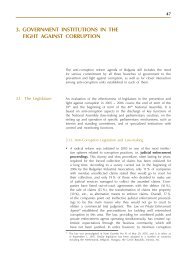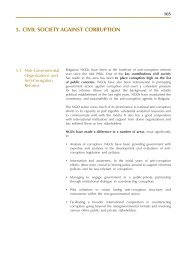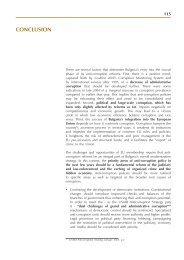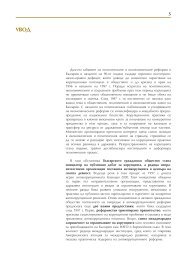Assessing the Effectiveness of Organized Crime Control Strategies ...
Assessing the Effectiveness of Organized Crime Control Strategies ...
Assessing the Effectiveness of Organized Crime Control Strategies ...
You also want an ePaper? Increase the reach of your titles
YUMPU automatically turns print PDFs into web optimized ePapers that Google loves.
In Canada, <strong>the</strong>re are no statutory provisions for granting a person total immunity from<br />
prosecution. A prosecutor does have <strong>the</strong> discretionary power to refrain from laying charges in<br />
return for an undertaking to provide testimony. The Law Reform Commission <strong>of</strong> Canada<br />
discourages this practice, taking <strong>the</strong> view that this informal system <strong>of</strong> granting immunity is<br />
invisible and lacking in accountability (cited in Beare, 1996). On <strong>the</strong> o<strong>the</strong>r hand, <strong>the</strong> Quebec<br />
Police Commission (1976:211), in its report on OC, found it lamentable that such agreements<br />
have been regarded in Canada as misuses <strong>of</strong> discretionary power. The Commission took <strong>the</strong><br />
view that, “…<strong>the</strong> decision not to lay charges against a suspect, when his collaboration is<br />
indispensable for <strong>the</strong> prosecution <strong>of</strong> o<strong>the</strong>r individuals <strong>of</strong> a higher rank than himself in <strong>the</strong><br />
organized crime hierarchy, represents a wise use <strong>of</strong> power which is entirely compatible with <strong>the</strong><br />
higher interests <strong>of</strong> justice.”<br />
In summary, <strong>the</strong>re are cogent arguments for and against <strong>the</strong> granting <strong>of</strong> immunity. However, this<br />
review did not find one shred <strong>of</strong> empirical evidence attesting to <strong>the</strong> utility <strong>of</strong> immunity. This<br />
observation is corroborated by Albanese (1996:193):<br />
Unfortunately, no objective empirical evidence has been ga<strong>the</strong>red to provide an<br />
indication <strong>of</strong> <strong>the</strong> relative costs (in terms <strong>of</strong> unprosecuted crimes and abuses <strong>of</strong><br />
immunity) versus <strong>the</strong> benefits (convictions <strong>of</strong> upper-echelon organized crime<br />
figures). When such information is assembled, a more reliable judgment can be<br />
made <strong>of</strong> how witness immunity can be best used to balance <strong>the</strong> interests <strong>of</strong> <strong>the</strong> public<br />
and <strong>the</strong> interests <strong>of</strong> <strong>the</strong> witness.<br />
4.10 Investigative Grand Juries<br />
In <strong>the</strong> United States’ federal system and in about half <strong>the</strong> states, a grand jury determines whe<strong>the</strong>r<br />
sufficient evidence exists to issue an indictment. The grand jury comprises a group <strong>of</strong> citizens<br />
drawn from <strong>the</strong> voting rolls. Aside from <strong>the</strong>se probable cause determinations, <strong>the</strong> grand jury<br />
may be used for investigative purposes as well. When so used, it has broad investigative<br />
authority, including <strong>the</strong> power to subpoena persons and documents (Abadinsky, 2003: 349). In<br />
<strong>the</strong> federal system and in those states where statutes permit, <strong>the</strong> grand jury is used to investigate<br />
corruption in government and law enforcement, as well as <strong>the</strong> activities <strong>of</strong> OC. They function<br />
much like citizen commissions, with <strong>the</strong> added benefit that <strong>the</strong>y can prosecute cases <strong>the</strong>y<br />
discover (Albanese, 1996: 197).<br />
The <strong>Organized</strong> <strong>Crime</strong> <strong>Control</strong> Act <strong>of</strong> 1970, enacted in <strong>the</strong> United States, requires <strong>the</strong> convening<br />
<strong>of</strong> a special grand jury at least every 18 months in federal judicial districts with a population in<br />
excess <strong>of</strong> one million. The life <strong>of</strong> <strong>the</strong>se grand juries can extend to 36 months, allowing for <strong>the</strong><br />
investigation <strong>of</strong> complex OC cases. The special grand juries hold secret proceedings during<br />
which <strong>the</strong> prosecutor presents evidence to establish probable cause for indictment. In some<br />
jurisdictions, such grand juries have <strong>the</strong> power to publish reports at <strong>the</strong> completion <strong>of</strong> <strong>the</strong>ir terms<br />
(Albanese, 1996:196). While governments are not required to act on <strong>the</strong>se reports, <strong>the</strong> publicity<br />
associated with <strong>the</strong>ir release encourages action.<br />
Research and Statistics Division / Department <strong>of</strong> Justice Canada | 37



